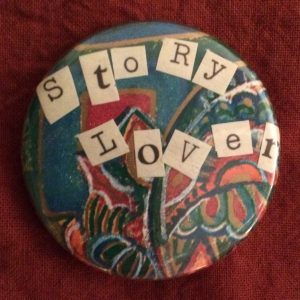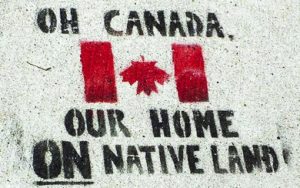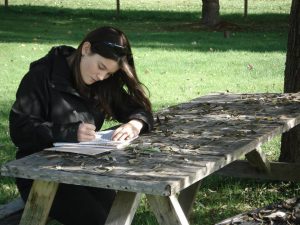
I love stories. They seem so magical and in an incredible way, can take me to another time and place, or, if I’m the one writing, help me to process the events and observations from my daily life. I have also loved storytelling for as long as I can remember, and through the prompt inspiring this post, I’ve had the opportunity to not only write and tell a story, but to also reflect on my own relationship with storytelling.
A few years ago, a friend of mine hosted a birthday party where we spent the afternoon drinking tea, catching-up, and making buttons with pieces of fabric, bits of paper, and meaningful words. I wanted to make one for myself that incorporated my love of stories, and I wrote-out the letters of “storyteller” for this button. However, when I started to lay-out the pieces, I paused. Within the society I knew, wouldn’t calling myself a storyteller suggest that I was stretching the truth? Or, perhaps, a liar, if that was what the storytelling implied?
I still have that button I made that says story lover instead of storyteller. Writing this post prompted me to reflect on this memory and to question: what are the relationships between storytelling and “lying?” What powers are contained within stories? What kind of stories do we tell ourselves and how do these stories affect who we are?
I’m lucky that I get to tell stories regularly to the children I work with. However, I found it different experience consciously telling a story to adults. My story changed each time I told it, and depending on how busy, or interested, or curious my audience was, I elaborated, or shorted, or summarized various parts of the tale. I was also acutely aware of how the stories I’ve heard and know affected my own storytelling—both the story itself and the way I told it.
The following story, inspired by Thomas King’s retelling of Leslie Silko’s story of how evil came into the world (9-10), is a version of the one that prompted these reflections, and the one that I shared with my family. In short, I have a great story to tell you; it goes like this:
***
Once there was magic throughout the world.
It flowed from the earth, it whispered in the winds, it lit-up the skies, it shimmered in the water. The magic was powerful, and it was abundant. It pulsed through the world, and created things of beauty—and destruction.
In fact, things were getting out of hand. The fire dragons were having far too good a time burning forests, which was causing the other forest creatures and spirits to become rather annoyed. The selkies were breaking hearts left, right, and center. Some creatures were using the magic to change the minds and behaviours of others. And the magic itself was bursting at the seams, increasing with each new life, it was literally shaking the earth, and breaking apart the land and the beings living there. (The humans, in case anyone was wondering, were not doing so well with their limited understanding of magic and imagination and their minimal amounts of claws, teeth, and other protection.)
Not only was the usual level of chaos at work, but things were beginning to escalate. Magic can become a rather unruly thing, especially when it is so prominent in the atmosphere, and a number of the earth’s inhabitants started to discuss how it would be good to meet and collaborate on working things out and soothing the magic’s unease.
So the witches decided to get together and have a conference. Actually, it wasn’t only the witches; everyone else was invited too, witches are just good at having conferences. Now, to put this in perspective, this was not an unusual occurrence; in fact, it was a rather regular thing. The witches just enjoyed getting together, playing games, and sharing magic. And that was pretty much what happened at this conference. Witches came from all around the world, along with any other beings that wanted to join. Witches of all genders, of all backgrounds, of all stories, of all places came to conference (witches generally enjoy conferencing); while a variety of other magical beings came to join the conference too.
Trying to calm this shock of magic, to make the it a bit more ruly, a bit more manageable so things could more easily live on the planet, was one of the conference’s themes—in addition to the usual shenanigans. And so the conference started.
Some witches began brewing, others began dancing. Some made faces, some made potions, some made mistakes. Some did magical tricks. Many worked together and tried to sooth the magic in the world; many didn’t. The magic continued to pulse dangerously.
By the end of their conference, almost every creature in attendance had done a trick, played a game, or at least tried to sooth the world’s magic.
Except one: the quietest witch, who had been observing the conference and the tricks and discussions of the others.
The others approached them asking: “Can you work the magic? Can you channel it and do something exciting, or scary, or both?” The quiet witch quickly opened their mouth, as if to reply to these questions, and… started to tell a story.
This story enfolded the dragons, dove with the selkies, and spoke of myth and legend. It included beginnings and endings and terrible, nearly unspeakable things, and things so beautiful, they nearly leapt beyond words. It told the listeners what to believe and what to disbelieve. It ensnared the imaginations and beliefs of those present and when the quiet witch-storyteller stopped, those present agreed that it had been a good story, an enjoyable story at least.
Yet, the witch should take it back. That story took its listeners to another place and suggested that the magic and magical things they knew did not exist; should not be believed in. The other witches and attending creatures wanted their magic back, along with their whole-hearted belief.
But the witch couldn’t. Not only had their words been a story, but it had captured their listeners’ imaginations; it had captured their belief.
It was magic.
It was a spell.
And once a spell is cast, there’s no taking it back; once a story is told, it is loose in the world (King 10).
The magic that had seemed so abundant and accessible before, started to fade away from the form it had shook the world in before. After the conference, as the effects of the story spread, the magical creatures and blunt forms of magic started to fade from the belief and sight of the common world.
Sometime later, one of the witches who had been at that fateful conference came across a number of people gathered around someone. Watching the group, they realized that someone was telling a story—someone familiar, telling a familiar story. They approached this storyteller and were struck by the way the imagination and belief of those listening was being captured… and smiled as they realized where the magic, and its power, had gone.
***
As suggested by another kind of witch in a story I know, “Careful the tale you tell / That is the spell” (“Children Will Listen Lyrics”). Thank you for listening to my stories.
—
Works Cited Continue reading

